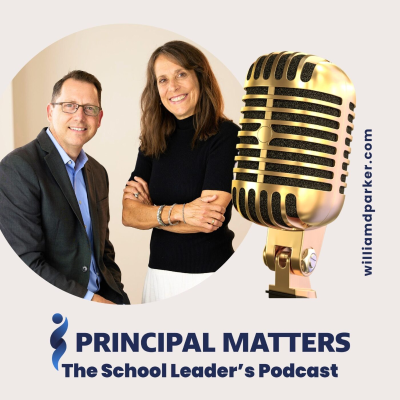
Principal Matters: The School Leader's Podcast with William D. Parker
engelsk
Teknologi og vitenskap
Prøv gratis i 14 dager
99 kr / Måned etter prøveperioden.Avslutt når som helst.
- 20 timer lydbøker i måneden
- Eksklusive podkaster
- Gratis podkaster
Les mer Principal Matters: The School Leader's Podcast with William D. Parker
With William D. Parker and Friends
Alle episoder
618 EpisoderPMP489: Leading with Heart and Strategy with Blaine Wise
A QUICK NOTE TO LISTENERS: Before this week’s interview, Will Parker and Jen Schwanke take some time to answer a listener question. This week’s question is particularly loaded, so it will be answered in two parts, with part two coming out next week. The question is: I’m a longtime listener and am reaching out because I’m struggling with burnout. I’d love to hear how you’ve navigated the most difficult stretches of your career. What helped you persevere? Are there particular podcast episodes or conversations you’d recommend for someone trying to regain perspective and resilience? Listen in to hear their response! MEET BLAINE WISE: Blaine Wise is a passionate and dedicated educational leader with 17 years of experience in Oklahoma public schools. Since 2021, he’s served as principal of Glenpool Middle School, where he’s led with purpose, building a high-performing, positive school culture that’s earned statewide recognition. In 2025, he was named the OASSP/OMLEA Middle Level Principal of the Year. Blaine began his career as a classroom teacher at Glenpool High School, later serving as a teacher and assistant principal at Charles Page High School and Charles Page Freshman Academy. With a strong foundation in instruction and leadership, he leads with both heart and strategy. He holds a bachelor’s degree from Haskell Indian Nations University and a master’s from Southern Nazarene University. Known for his collaborative, student-centered approach, Blaine serves in multiple leadership roles through CCOSA, OMLEA, and NASSP—including as OASSP President-Elect. In 2025, he launched his website to share actionable leadership strategies that ignite purpose in educators and inspire excellence in students. Blaine Wise leads with gratitude, models excellence, and is committed to supporting students, staff, and the broader school community. INTERVIEW TAKEAWAYS: Blaine Wise’s journey into the profession began unexpectedly after a closed door to a job opportunity opened the door to teaching. A proud member of the Seminole Nation, Blaine holds a Bachelor of Arts in American Indian Studies. He initially explored career paths with that degree outside of education. However, once he began teaching, he found his calling and has never looked back. Blaine believes that effective leadership requires a strong commitment to building and sustaining school culture. He emphasizes that culture does not happen by accident—it must be intentional and consistently cultivated through daily interactions and leadership practices. * Culture is intentional. It is shaped through the way leaders conduct meetings, interact with staff, and communicate one-on-one. * Leadership interactions matter. “We can’t control how people feel, but we’re responsible for how we interact with them,” he explains. * A guiding principle: Support in public and correct in private. When offering advice to new leaders, Blaine highlights the importance of humility, action, and collective wisdom: * Build a trusted network of mentors for guidance and support. * Remember, “It’s not your school—it’s our school.” * Take action on good ideas; leadership is both a privilege and a responsibility. * “The smartest person in the room is the room”—use collective knowledge to guide decisions. * Learn through trial and error, and commit to intentional reflection. * Share school-wide plans and maps in advance to foster clarity and trust. For veteran leaders, Blaine encourages replacing the word motivated with inspired or committed. He believes staying inspired comes from returning to cycles of reflection and remembering why you lead in the first place. * Take time to pause before making major decisions. * Revisit your “why” by being the kind of teacher and principal you once needed. * Protect your time for thoughtful decision-making by sometimes closing the door or asking for a moment to think. Blaine draws inspiration from other educational leaders, including Baruti Kafele, and continually asks himself, “Is my school better because I lead it?” He even wears a whistle daily to remind himself that, at his core, he is the coach of his school. In addition to his work as a principal, Blaine shares leadership insights through his website [https://blainewise.com/]. He also loves to speak to schools and welcomes opportunities to collaborate with other leaders. The post PMP489: Leading with Heart and Strategy with Blaine Wise [https://williamdparker.com/2026/pmp489-leading-with-heart-and-strategy-with-blaine-wise/] appeared first on Principal Matters [https://williamdparker.com].
MONDAY MATTERS with Jen Schwanke and Will Parker – Stretching Students Beyond the Test
This week’s Monday Matters episode is a longer response to a listener question covered in the Q&A portion of Principal Matters Podcast. The question is: > “As a system leader, how do you encourage teachers in high-performing schools to go beyond “my students do well on the tests” or even other administrators, “have you seen our test scores?” and aim for instruction that really stretches students’ thinking, agency, and intellectual rigor? I’m especially curious how you do this when current success metrics and evaluations tend to reinforce the status quo.” – Cat Stathulis, Westerville, Ohio In response to Cat’s question about how to push high-performing schools beyond strong test scores toward deeper intellectual rigor, Will and Jen’s conversation is centered on redefining what “rigor” really means. First, leaders must remember the realities of the teenage brain. Students have limited cognitive and emotional stamina. A student can perform well on a test yet still need structured opportunities to build endurance for extended thinking. High scores do not automatically equal deep learning. Second, rigor does not require more assignments or heavier workloads. It often happens through better conversation. Simple questions like “What are you thinking?”, “Tell me more,” and “Why?” can stretch thinking far more effectively than additional worksheets. Dialogue itself can deepen learning. The discussion also emphasized being intentional about levels of questions on tests. Teachers should plan questions at three levels: * Level 1: Facts and recall (Do students understand the material?) * Level 2: Interpretation and analysis (Can they connect and explain ideas?) * Level 3: Application (Can they use and transfer what they know?) Deep learning frequently operates at Levels 2 and 3 — and that depth does not always show up immediately on standardized tests. Another key measure of success is readiness. Beyond scores, leaders should ask: Are students prepared for what comes next — academically, intellectually, and personally? Finally, teachers themselves must stretch. Thoughtful teaching sharpens not only student thinking but also teacher clarity about what students truly understand. Big takeaway: Rigor isn’t about more work or higher test numbers. It’s about intentional questioning, intellectual stretch through conversation, and preparing students for the next stage of life — even when that growth isn’t easily measured. RESOURCES FOR FURTHER LEARNING: In addition, Jen and Will discussed two resources from previous podcast guests that unpack practical ways for educators to go deeper in their own teaching practices as well as in student learning. Listen in to the entire podcast conversation for more, and check out these resources and previous guests. PMP177: Cha Cha’s for Making Learning Stick with LeAnn Nickelsen [PMP177: Cha Cha’s for Making Learning Stick with LeAnn Nickelsen] PMP420: Mentoring Mindset with David Yeager [PMP420: Mentoring Mindset with David Yeager ] The post MONDAY MATTERS with Jen Schwanke and Will Parker – Stretching Students Beyond the Test [https://williamdparker.com/2026/monday-matters-with-jen-schwanke-and-will-parker-stretching-students-beyond-the-test/] appeared first on Principal Matters [https://williamdparker.com].
ENCORE FRIDAY – PMP268: Equity, Equality, and Systems with Enid Lee
Happy Friday! Our encore episode for the third week of Black History Month is an interview with Enid Lee. She is a front-line educator, an anti-racist professional development specialist, leadership coach, writer and community builder. [https://williamdparker.com/wp-content/uploads/2026/02/EnidLee-642x1024.webp] Originally recorded in 2021, this conversation is as relevant in 2026 as it was then. Listen in to hear the entire conversation, and read the original blog post here [https://williamdparker.com/2021/pmp268-equity-equality-and-systems-with-enid-lee/] to learn more about Enid Lee! You can find more about Enid Lee and her resources for schools at https://www.enidlee.com/resources [https://www.enidlee.com/resources]. The post ENCORE FRIDAY – PMP268: Equity, Equality, and Systems with Enid Lee [https://williamdparker.com/2026/encore-friday-pmp268-equity-equality-and-systems-with-enid-lee-2/] appeared first on Principal Matters [https://williamdparker.com].
PMP488: Empowering Student Voices with PAHS Principal Advisory Committee
A QUICK NOTE TO LISTENERS: Before this week’s interview, Will Parker and Jen Schwanke take some time to answer a listener’s question. This week’s question is: As a system leader, how do you encourage teachers in high-performing schools to go beyond “my students do well on the tests” or even other administrators, “have you seen our test scores?” and aim for instruction that really stretches students’ thinking, agency, and intellectual rigor? I’m especially curious how you do this when current success metrics and evaluations tend to reinforce the status quo. Listen in to hear their response! [https://williamdparker.com/wp-content/uploads/2026/02/PMP-Template-11-1024x1024.png] MEET THE PALO ALTO HIGH SCHOOL PRINCIPAL ADVISORY COMMITTEE: Brent Kline is the Principal of Palo Alto High School and a student-centered leader known for driving instructional improvement, equity, and strong community engagement. A former Washington State High School Principal of the Year and national finalist, he arrived at Paly in 2020. He has elevated student and staff voice—creating student-driven, student-led advisory meetings that guide his leadership and offer feedback to teachers. He has also supported innovative programs that helped Paly earn recognition as a Top-10 finalist for the World’s Best School Prize in Innovation. Kline holds degrees from CSU Hayward and Western Washington University. In this episode, he is joined by three PAC Executives: * Brian Miller-Junior * Sione Fusimalohi-Junior * Amalia Tormala-Senior Charlotte Barclay-Senior is also a member of the PAC Executive Committee, but was absent from this interview, getting her wisdom teeth pulled. These student members are part of the Principal Advisory Committee at Palo Alto High School and share what inspired them to apply and why student voice matters so deeply in school leadership. They explain how underrepresented students benefit when they have a meaningful platform to be heard, and why teachers need insight into how students want to grow—not just for short-term gains, but for long-term success. The students discuss the value of choice, agency, and project-based learning, including opportunities to select their level of challenge and design their own learning experiences. We also explore the power of relationships, the “why” behind learning, and the importance of school leaders stepping back to let students take an active role in shaping their school community. What began as a program with 30 applicants has grown significantly—this year, 90 students applied, with 25 selected to serve. Each student leader describes how the committee helps them advocate for all students, represent the diversity of their school, and build a trusting, honest partnership with their principal. Learn more on the Palo Alto High School website or contact Principal Brent Kline at bkline@pausd.org. The post PMP488: Empowering Student Voices with PAHS Principal Advisory Committee [https://williamdparker.com/2026/pmp488-empowering-student-voices-with-pahs-principal-advisory-committee/] appeared first on Principal Matters [https://williamdparker.com].
MONDAY MATTERS with Jen Schwanke and Will Parker – Leadership Lessons From an Admiral
Welcome back to Monday Matters! Recently, Will attended his nephew’s naval flight school graduation. While at the graduation, an Admiral gave a speech to the graduates that centered around these three main points: Know your mission, be decisive, and invest in your people. This week, Will Parker and Jen Schwanke take some time to reflect on those three points and talk about how they apply to the role of a principal. Listen in to hear the full conversation! Below is an article written by Will to accompany this week’s episode. LESSONS FROM A NAVAL FLIGHT SCHOOL GRADUATION William D. Parker [https://williamdparker.com/wp-content/uploads/2026/02/stephenwings.jpg]Stephen and his family, January 30, 2026 Last week, my wife and I met family members in Pensacola, Florida, to celebrate the graduation of my nephew, Stephen, who received his wings as a flight officer. The ceremony was held at the National Naval Aviation Museum, and officers from several command groups were being honored. Among the hanging planes, flying colors, and many command officers on stage, an Admiral visiting from his post in Washington, D.C., addressed everyone with three reminders for the soon-to-be flight officers to keep in mind: * Know your mission. * Be decisive. * Invest in your people. Of course, he applied each of these principles to the leadership required for officers in difficult situations that require clarity, firm responses, and a deep understanding of both practice and combat situations. As I listened, I immediately began thinking about the conversations I have with school leaders. Each day, you have a similar pathway in front of you. People want to know that what they are doing has a purpose and goal in mind beyond the day-to-day operations of “doing school.” I like to call this the “walk to the front door speech.” Each day, when you arrive at school, you have a question to answer: Why are you here? You can either tell yourself the story that your purpose is to put out fires, keep school from descending into chaos, or wish everyone would just get along. Or you can remind yourself that ultimately you want to provide solutions to challenges, help resolve conflicts and restore relationships, and build a community where students and teachers can flourish. One of those statements is rooted in mission, while the other is rooted in fear. Choose the mission. Second, you must be a decisive leader. This does not mean a rash or impulsive leader. Decisiveness means you learn how to analyze the variables in front of you, consider the options available, and then make a choice. Once you make that choice, you move ahead with confidence. I remember one day when we had an alert of a potential threat on campus. I was with one of our security personnel at the time, but the call was mine to make on next steps. Without going into details that would divulge confidentiality, we decided to watch video surveillance to see if the report was reliable, and when it appeared clear that it was, we took action to secure a location and bring a student in for questioning. When I looked back at the situation later, I realized several steps we could have taken instead of the ones we chose. However, in the moment, our decisiveness isolated the situation and brought it to a quick and safe resolution. Of course, not every situation requires that kind of safety decision-making. Whatever decision you are making, you will have time to reflect and reevaluate after implementation, but hesitating on action sends signals to others that school is a place of instability instead of stability. You will also never have 100% buy-in from others when you are a decision-maker. The goal is not agreement, however, but action that is based on your policies, practices, experience, and environment. Even though you never make perfect decisions, you do find over time that some decisions become second nature when you are confronting similar ones moving forward. Finally, I appreciated the reminder that relationships matter. When you are stepping into any kind of environment, people need to know you care about them as much as you care about the outcomes. When we invest in knowing people, spending time with them, learning about their families and their hobbies, and appreciating them as people, they tend to see you not just by your title but also as a person. This works for everyone in your community: bus drivers, office staff, teachers, cafeteria workers, counselors, parents, and students. I don’t want to create any unrealistic expectations that the goal is for everyone to like you. Instead, the goal should be to earn their respect by how you lead. And we are much more likely to respect someone who is clear and kind. Leaders can be both. In order for my nephew Stephen to receive his wings, he had to undergo months of training in classrooms and in the air. When I saw him walk across that stage and watched as his wife and three young children surrounded him for a group photo, I was reminded that he was experiencing a milestone. At the same time, he is just beginning a new adventure. Last week, a young man who is a junior at a nearby university reached out to me by email. He is pursuing a future in education, and he listens to my podcast. I was humbled and encouraged by his curiosity and his desire to learn as much as he can about leadership—even before he finishes his undergraduate degree. His curiosity reminded me that our work never stops, whether we are leading at a school level or supporting those who are. I encouraged him to reach out to other education leaders he admires, and I introduced him to a friend to start his next conversation. Talking to him reminded me that the principles involved in building and leading schools are not a secret formula. Just as I watched a Navy Admiral pass along lessons to new flight officers, those lessons are transferable from generation to generation. Know your mission. Be decisive. Invest in others. These truths may not make the journey easier, but they are certain to lead to better outcomes. The post MONDAY MATTERS with Jen Schwanke and Will Parker – Leadership Lessons From an Admiral [https://williamdparker.com/2026/monday-matters-with-jen-schwanke-and-will-parker-leadership-lessons-from-an-admiral/] appeared first on Principal Matters [https://williamdparker.com].
Velg abonnementet ditt
Premium
20 timer lydbøker
Eksklusive podkaster
Gratis podkaster
Avslutt når som helst
Prøv gratis i 14 dager
Deretter 99 kr / måned
Premium Plus
100 timer lydbøker
Eksklusive podkaster
Gratis podkaster
Avslutt når som helst
Prøv gratis i 14 dager
Deretter 169 kr / måned
Prøv gratis i 14 dager. 99 kr / Måned etter prøveperioden. Avslutt når som helst.















































